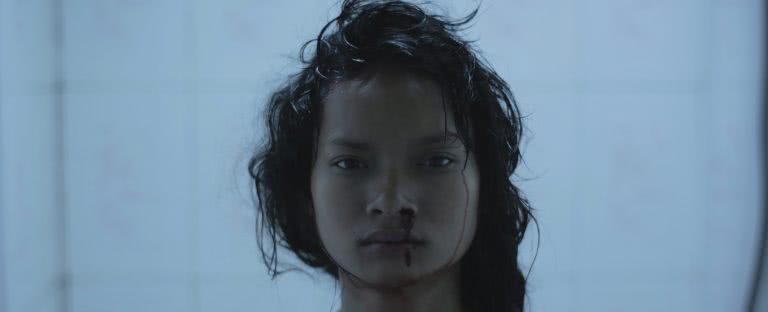“You’d spend three or four weeks finding an amazing elderly woman for a key scene, and then you’d be really happy with her performance in the auditions and rehearsals, and then you’d get to the shoot in a location that was really difficult because it was reliant on getting permits to shoot in a place that’s a little sketchy, and we needed machine-gun-clad police officers to film with us in certain neighbourhoods, and then an absolute stranger would arrive, another old woman, to shoot the scene, and we’d have to shoot the scene with this old woman we’d never met before…”
If Amiel Courtin-Wilson sounds slightly delirious when recalling the shooting of Ruin – on which he shares a directing credit with longtime producer Michael Cody – it just reflects the quick gestation and freeform production of the film itself. Courtin-Wilson’s previous feature was the blistering Hail, an experimental/experiential docudrama based on the life and experiences of lead actor and subject Daniel P. Jones, which is indisputably one of the most audacious films made in this country in recent years. The dreamy, impressionistic Ruin continues Courtin-Wilson’s fascination with the way reality and documentary material can shape or be shaped into fiction; he tells me that the film was at one stage going to be a straight-up essayistic documentary in the vein of Chris Marker.
“It was borne of Michael’s longstanding connection with Cambodia and Southeast Asia; he was a foreign correspondent there, covering the trials of the Khmer Rouge,” says Courtin-Wilson. “The genesis of the film was a combination of his fascination with that country’s history and his previous work as an academic, looking at ideas of sound and trauma and how they interrelate … My contribution was looking at how we could take that methodology we explored with Hail and push it to its limits, in terms of working in a place of sheer naivety and momentum.”
As such, he and Cody “literally landed in Cambodia on October 8, with no script, no sense of story other than a loose thematic interest in this idea of trauma, no cast, no money, no crew”, and eventually arrived at a skeletal story that would suit that thematic core, as well as accommodate the locals that stood out to them. Led by non-actors Rous Mony and Sang Malen, the film follows two young lovers who together escape a brutal and exploitative world of crime and violence.
“A Badlands-style road-movie-slash-love-story enabled us to embrace the vagaries of the process, which was mainly to do with being able to expand or contract the narrative according to the characters we met along the way.” These included, says Courtin-Wilson, “High-ranking police officials, [a] wealthy real estate owner, ex-child-prostitutes… I would say we met with probably 2,000 people in the space of three weeks,” adding that sometimes they would be shooting for 20 hours a day, for four or five days straight.
Ruin premiered in the Orizzonti (Horizons) sidebar at the Venice Film Festival last year – where Hail also played in 2011 – winning the Special Jury Prize from Paul Schrader’s jury, and just last month it won the directing prize at Brazil’s Fantaspoa Film Festival. At the Sydney Film Festival this year, it plays in the Official Competition section, competing against 11 other titles including Richard Linklater’s universally acclaimed Boyhood and this year’s Berlin Golden Bear-winning Black Coal, Thin Ice. In spite of these plaudits, when speaking to Courtin-Wilson one gets the impression that it’s the process that matters most to him, however accomplished the end results are. “I found [Ruin] a hugely exhilarating experience, as an experiment, to see what stories would come to the fore.”
Ruin is part of the official Sydney Film Festival Program and will be showing on Tuesday June 10 and Wednesday June 11. The full program and tickets are available online.


































